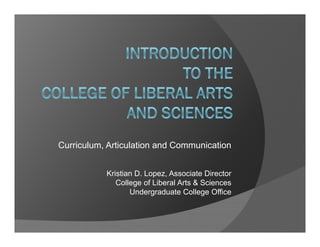Introduction to the College of Liberal Arts and Sciences - Curriculum, Articulation and Communication
- 1. Curriculum, Articulation and Communication Kristian D. Lopez, Associate Director College of Liberal Arts & Sciences Undergraduate College Office
- 2. BirdĪ»s Eye View of the College of Liberal Arts and Sciences (LA&S) ? 35 degree granting programs ? Bachelor of Arts & Bachelor of Science degrees ? Liberal Education ? Urban and Vincentian Mission of DePaul
- 3. Liberal Studies Program and the Major
- 4. Liberal Studies Program ©C Common Core ? Common Core ? First Year Program Ī Chicago Quarter (LSP 110/111 and LSP 112) Ī First Year Writing (WRD 103 and WRD 104) Ī Math and Technological Literacy (LSP 120 and LSP 121) ? Sophomore Seminar on Multiculturalism in the United States (LSP 200) ? Junior Year Experiential Learning ? Senior Capstone Seminar
- 5. Liberal Studies ©C Learning Domains ? Arts and Literature (AL) ? Philosophical Inquiry (PI) ? Religious Dimensions (RD) ? Scientific Inquiry (SI and SI:Lab) ? Self, Society and the Modern World (SSMW) ? Understanding the Past (UP)
- 6. Studies in the Major ? Most LA&S major field programs are comprised of three components: ? Core: Courses required by all students who have declared the major ? Concentration: Specialized courses designed for career preparation ? Supporting / Allied Field: Required courses that compliment the major, and are offered through an academic ff d h h d i department(s) outside of the major
- 7. Open Electives ? Courses that are required for g q graduation ? Open electives are not applied toward Liberal Studies or the major but can major, apply toward a double major or minor ? The number of open electives varies according to major ? Open electives may be taken Pass/Fail
- 8. Tools for Pl T l f Planning and T ki P i d Tracking Progress T Towards th d the DePaul Degree
- 9. Credit Evaluation MAJOR CORE LIBERAL STUDIES MAJOR OPEN ELECTIVES PROGRAM (LSP) CONCENTRATIONS
- 10. Degree Progress Report (DPR) OPEN ELECTIVES MAJOR CORE LIBERAL STUDIES MAJOR PROGRAM (LSP) CONCENTRATION
- 12. Communication with Faculty ? Department chairpersons (or designates) make articulation recommendations ? Faculty wear many hats ? Build a relationship ©C build trust! ? Provide details that could impact the articulation recommendation: ? Major field structure ? Pre-requisites ? Articulation precedent ? Course sequencing ? Major vs. Non-Major ? Understand the recommendation, and how the course applies within the DePaul curriculum ? If you need clarification, donĪ»t be afraid to ask! ? Faculty articulate ©C we coach and coordinate!
- 13. Course Sequencing ©C Semester vs. Quarter ? 2 semesters = 3 quarters = 1 year of study ? Calculus I + Calculus II at a semester institution = Calculus I, Calculus II and Calculus III at DePaul ? Spanish I + Spanish II at a semester institution = Spanish I, Spanish II and Spanish III at DePaul ? Bi l Biology I + Bi l Biology II at a semester institution = Biology I, Biology II and Biology III at DePaul
- 14. Communication with Students ? OAAS Advising g ? Orientation Advising ? Major Field Advising ? College Office Advising ? LAST LASTransfer f ? We are here for our students!
- 15. Transfer Credit Supporting Documentation Request
- 16. First Year Writing and Math / Technological Literacy
- 17. First - Year Writing ? Associate Director of First Year Writing g reviews courses for application toward the first year writing requirement ? Per the Department of Writing, Rhetoric and Discourse, the Associate Director of First Year Writing usually makes articulation recommendations for WRD 103 and WRD 104 ? Per the Liberal Studies Waiver and Substitution Policy, the Associate Director of First Year Writing makes substitution recommendations for other courses th t may meet the objectives of th that t th bj ti f first year writing, but are not articulated as WRD 103 and/or WRD 104 at DePaul
- 18. Math and Tech Literacy (MTL) ? Director of the Quantitative Reasoning Program reviews courses for application toward the Math and Tech Literacy (MTL) requirement i ? Makes articulation recommendations for LSP 120 and LSP 121 ? Makes substitution recommendations for other courses that may meet the objectives of MTL, but are not articulated as LSP 120 and/or LSP 121 at DePaul



















